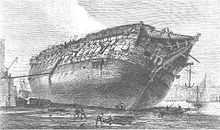HMS Queen (1839)
 HMS Queen, Flagship of Vice Admiral Sir Edward Rich Owen, Commander-in-Chief of the Mediterranean fleet, leaving Malta (Robert Strickland Thomas, 1842) | |
| Career (UK) | |
|---|---|
| Name: | HMS Queen |
| Ordered: | 29 October 1827 |
| Builder: | Portsmouth Dockyard |
| Laid down: | November 1833 |
| Launched: | 15 May 1839 |
| Fate: | Broken up, 1871 |
| Notes: | Screw ship from 1859 |
| General characteristics [1] | |
| Class and type: | 110-gun first rate ship of the line |
| Tons burthen: | 3104 bm |
| Length: | originally 204 ft 2 1⁄2 in (62.2 m) (gundeck) 166 ft 5 1⁄4 in (50.7 m) (keel) as converted 216 ft 7 1⁄2 in (66.0 m) (gundeck) 174 ft 1 3⁄4 in (53.1 m) (keel) |
| Beam: | 60 ft 0 1⁄2 in (18.3 m) |
| Depth of hold: | 23 ft 9 in (7.2 m) |
| Propulsion: | Sails (and screw later) |
| Armament: | (originally) 110 guns:
(as converted to screw propulsion) 86 guns:
|
HMS Queen was a 110-gun first rate ship of the line of the Royal Navy, launched on 15 May 1839 at Portsmouth. She was the last sailing battleship to be completed before the advent of steam. She was initially ordered in 1827 under the name Royal Frederick, but was renamed on 12 April 1839 while still on the stocks in honour of the recently enthroned Queen Victoria. She was originally ordered as the final ship of the Broadened Caledonia class, but on 3 September 1833 she was re-ordered to a new design by Sir William Symonds.
This was the only ship completed to this Symonds draught, although three other sisters were originally ordered to the same design; of these a ship originally ordered at Portsmouth Dockyard on 12 September 1833 as the Royal Sovereign took over the name Royal Frederick on 12 April 1839, and was eventually completed as a screw battleship under the name of Frederick William. Of the remaining two intended sisterships, both ordered from Pembroke Dockyard on 3 October 1833, the Algiers was eventually completed as a 90-gun screw battleship, while the Victoria was eventually completed as a 90-gun screw battleship under the name of Windsor Castle.[1]
In 1842 she was visited by Queen Victoria.
In 1854, she participated in the bombardment of Sevastopol, Ukraine during the Crimean War. She was set on fire three times and eventually forced to withdraw from the action. The famous Timothy the tortoise, who was about 160 years old when she died in 2004, was the ship's mascot during this time.,[2]
Between August 1858 and April 1859 the Queen was converted at Sheerness Dockyard to steam propulsion, being at the same time cut down from three decks to two gundecks, and re-armed as an 86-gun ship. She was fitted with a Maudslay, Sons and Field 500 nhp engine and single screw propulsion.[1] Now, being able to cruise at 10.5 knots (12.1 mph; 19.4 km/h), she was commissioned into the Mediterranean Fleet until 1864.
The ship was broken up in 1871 at Surrey Canal Wharf in Rotherhithe, on the River Thames.[1][3]

Notes
- ↑ 'Timmy the tortoise dies aged 160' BBC News 7 April 2004
- ↑ Rankin, Stuart (July 2004). Shipyards, Granaries and Wharves, Maritime Rotherhithe, History Walk B. London: Southwark Council. ISBN 0-905849-37-X.
References
- Lavery, Brian (2003) The Ship of the Line – Volume 1: The development of the battlefleet 1650–1850. Conway Maritime Press. ISBN 0-85177-252-8.
- Lyon, David and Winfield, Rif (2004) The Sail and Steam Navy List, 1815–1889. Chatham Publishing. ISBN 1-86176-032-9.
- Bonhams, Lot notes for the painting of the HMS Queen leaving Malta, by Robert Strickland Thomas.
External links
| Wikimedia Commons has media related to HMS Queen (1839). |